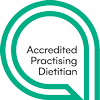Should I restrict how much chocolate my child eats this Easter?
It’s almost Easter, and if you’re a parent, you may be bracing yourself for the onslaught of chocolate bunnies and Easter eggs. Maybe you’re worried that your child will want to eat ALOT of chocolate. So, should you restrict how much chocolate they eat or ban it altogether?
No! That’s right, I’m advocating to let your child eat chocolate! As tempting as it might be to micromanage your kids’ consumption of chocolate and sweets over Easter, more flexibility around food helps create healthier long-term eating habits
Restricting foods can be counterproductive
While banning chocolate might seem like the best way to raise healthy eaters, this is not necessarily the case. Banning certain foods can lead to kids wanting these foods more, eating more of these when they are available, and eating these foods when they’re not even hungry³ ⁴
The key is to include these foods as part of your child’s normal diet, but within the structure of regular meal and snack times. Kids who have regular access to all foods (but not constant access) learn to eat intuitively – that is, they eat as much as they feel like and stop when they’ve had enough. This is what we want. We want our kids to tune into their body’s hunger and fullness signals. We want them to learn that chocolate is just food. We want them to eat and enjoy chocolate without becoming obsessed with it.
Easter Sunday comes only once a year
Remember that Easter Sunday only comes once a year and if your child is active and eats a nutritious diet most of the time, chocolate over Easter is unlikely to do them harm.
5 Top tips for Easter Sunday
1. Buy what you need
Think about how much chocolate you actually need to run an Easter egg hunt and buy accordingly. Often, we get carried away when we go shopping for Easter and come back with far more chocolate than we can actually enjoy eating. And don’t forget your kids will mostly likely have more chocolate after visits with two sets of grandparents (if that’s the case for you this year). You could also think about other options for Easter gifts to complement the chocolate.
2. Enjoy a satisfying breakfast together
Having a satisfying breakfast together as a family is a great way to set everyone up for the day. A satisfying breakfast is one that includes foods rich in at least two of the following macronutrients (protein, fat and carbohydrate). Some examples are: muesli, yoghurt and fruit; porridge with fruit; eggs and toast; omelette or frittata wedges.
3. Easter Egg Hunt
If you’re planning have an Easter Egg hunt in your garden leave a carrot out the night before for the Easter Bunny (there’s an opportunity for your kids to interact with a vegetable!). Eat and enjoy some Easter eggs with your kids. Let them eat as much chocolate as they like. Don’t comment on how much they eat. If they overdo it, and they get a stomach ache, just consider that a valuable learning opportunity for your child!
4. After the Easter egg hunt
From Easter Monday any leftover Easter eggs and other sweets can be offered at structured snack times. You can offer it along with another food (maybe fruit, milk, crackers). You decide on the snack times you offer chocolate and other foods and your child decides how much to eat. This means they get to eat chocolate but not all day long! You could also choose to put some out for dessert at dinner time, but at snack times they are in charge of the amounts.
5. Enjoy some family activity!
Easter is also a great opportunity to be more active. This could include family walks, bike riding, games of football/soccer in the park, even home-made obstacle courses in the back yard. Be a role model, join in and above all make it fun!
Bottom line
Keep the big picture in mind. ALL foods can be included as part of a healthy, balanced diet, and no foods should be completely off limits.
If you feel your child is still eating a lot of Easter chocolate or sneaking it, talk to them without anger or judgment about what’s going on. It could be that they feel deprived of chocolate and sweets outside of the holidays, which is something you can talk about together and reach a compromise on that you both feel good about.
I hope these tips help you and your kids enjoy Easter!
Happy Easter!
If you do feel worried about your child’s eating habits, please get in touch with a paediatric dietitian experienced in Intuitive Eating. It will make such a difference to you and your child in the long run.
References:
¹ Birch, L., Fisher, J., Davison, K. (2003) Learning to overeat: Maternal use of restrictive feeding practices promotes girls’ eating in the absence of hunger Am J Clin Nutr; 78:215–220. Available from: https://pubmed.ncbi.nlm.nih.gov/12885700/
² Farrow CV, Haycraft E, Blissett JM.(2015). Teaching our children when to eat: how parental feeding practices inform the development of emotional eating—a longitudinal experimental design. Am J Clin Nutr. 101(5):908-913. Available from: https://pubmed.ncbi.nlm.nih.gov/25787999/




